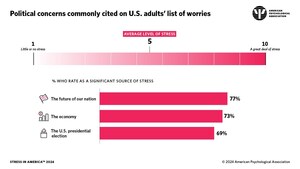APA's Survey Finds Constantly Checking Electronic Devices Linked to Significant Stress for Most Americans
Stress in America™ poll shows parents struggling to balance personal and family technology use
WASHINGTON, Feb. 23, 2017 /PRNewswire-USNewswire/ -- A decade after the emergence of smartphones, Facebook and Twitter, more than four out of five adults in the U.S. (86 percent) report that they constantly or often check their email, texts and social media accounts, according to part two of the American Psychological Association's (APA) report Stress in America™: Coping with Change released today. This attachment to devices and the constant use of technology is associated with higher stress levels for these Americans.
Constant Checkers Experience Higher Stress
Excessive technology and social media use has paved the way for the "constant checker" — those who check their email, texts and social media accounts on a constant basis. The survey found that stress runs higher, on average, for constant checkers than for those who do not engage with technology as frequently. On a 10-point scale, where 1 is "little or no stress" and 10 is "a great deal of stress," the average reported overall stress level for constant checkers is 5.3, compared with 4.4 for those who don't check as frequently. Among employed Americans who check their work email constantly on their days off, their reported overall stress level is even higher, at 6.0.
"The emergence of mobile devices and social networks over the last decade has certainly changed the way Americans live and communicate on a daily basis," said Lynn Bufka, PhD, APA's associate executive director for practice research and policy. "Today, almost all American adults own at least one electronic device, with many being constantly connected to them. What these individuals don't consider is that while technology helps them in many ways, being constantly connected can have a negative impact on both their physical and mental health."
For the past decade, APA's Stress in America survey has examined how stress affects American adults' health and well-being. The survey was conducted online between Aug. 5 and 31, 2016, among 3,511 adults ages 18+ living in the U.S. by Harris Poll on behalf of APA.
Parents Struggle to Manage Children's Technology Usage
Parents also seem to be feeling the pressure to balance their children's technology use as it affects familial interactions. While 94 percent of parents say that they take at least one action to manage their child's technology usage during the school year, such as not allowing cell phones at the dinner table (32 percent) or limiting screen time before bed (32 percent), almost half (48 percent) say that regulating their child's screen time is a constant battle, and more than half of parents (58 percent) report feeling like their child is attached to their phone or tablet.
Additionally, almost half of parents (45 percent) say they feel disconnected from their families even when they are together because of technology. More than half of parents (58 percent) say they worry about the influence of social media on their child's physical and mental health.
Effects of Social Media and Need for Digital Detox
Social media also negatively affects a greater proportion of constant checkers compared with those who do not check as frequently. More than two in five constant checkers (42 percent) say that political and cultural discussions on social media cause them stress, compared with 33 percent of non-constant checkers. Additionally, 42 percent of constant checkers say they worry about negative effects of social media on their physical and mental health, compared with 27 percent of people who don't check as often.
Almost two-thirds of Americans (65 percent) somewhat or strongly agree that periodically "unplugging" or taking a "digital detox" is important for their mental health. However, only 28 percent of those who say this actually report doing so.
"Taking a digital detox is one of the most helpful ways to manage stress related to technology use," Bufka said. "Constant checkers could benefit from limiting their use of technology and presence on social media. Adults, and particularly parents, should strive to set a good example for children when it comes to a healthy relationship with technology."
For the first time in the survey's 10-year history, APA released it in two parts, including this section focusing on stress related to technology and social media. The first section (released on Feb. 15) highlighted how Americans are stressed about the future of our nation, with concerns about the current political climate and the outcome of the presidential election.
To read the full Stress in America report or to download graphics, visit www.stressinamerica.org.
For additional information on stress, lifestyle and behaviors, visit www.apa.org/helpcenter. Join the conversation about stress on Twitter by following @APAHelpCenter and #stressAPA.
Methodology
The Stress in America™ survey was conducted online within the United States by Harris Poll on behalf of APA between Aug. 5 and 31, 2016, among 3,511 adults ages 18+ who reside in the U.S. Surveys were conducted in English and Spanish. Data were weighted to reflect their proportions in the population. Weighting variables included age, gender, race/ethnicity, education, region and household income. Propensity score weighting also was used to adjust for respondents' propensity to be online. Hispanic respondents were weighted for acculturation, taking into account respondents' household language as well as their ability to read and speak in English and Spanish. Because the sample is based on those who were invited and agreed to participate in the Harris Poll online research panel, no estimates of theoretical sampling error can be calculated. A full methodology is available upon request.
The American Psychological Association, in Washington, D.C., is the largest scientific and professional organization representing psychology in the United States. APA's membership includes more than 115,700 researchers, educators, clinicians, consultants and students. Through its divisions in 54 subfields of psychology and affiliations with 60 state, territorial and Canadian provincial associations, APA works to advance the creation, communication and application of psychological knowledge to benefit society and improve people's lives.
SOURCE American Psychological Association
Related Links
WANT YOUR COMPANY'S NEWS FEATURED ON PRNEWSWIRE.COM?
Newsrooms &
Influencers
Digital Media
Outlets
Journalists
Opted In





Share this article